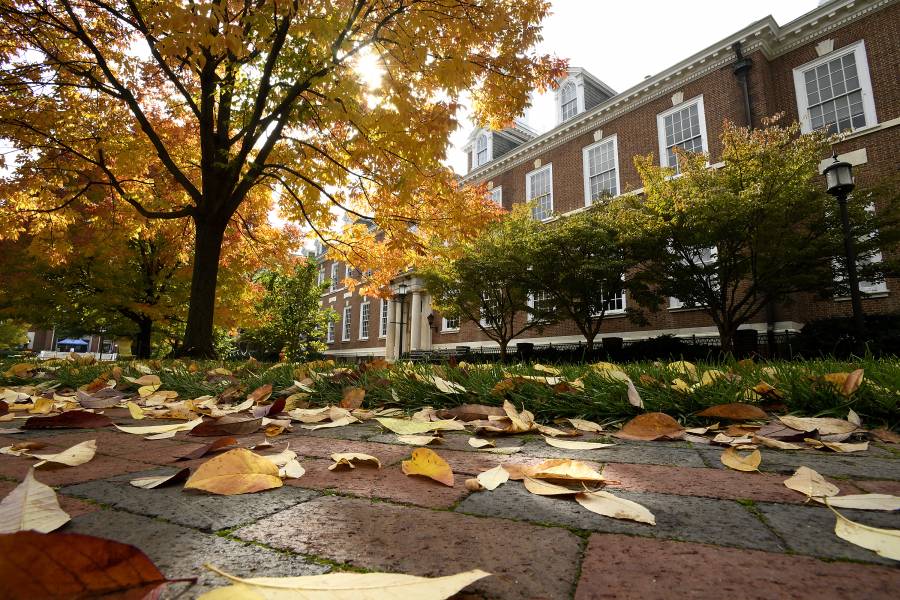Johns Hopkins leaders are seeking input from the university community on the development of an ambitious new sustainability plan that will build on more than a decade of progress and will advance university practices and commitments in operations, teaching, and research. The new plan will examine priorities for the university including thematic areas of health, equity and environmental justice, research, and local and regional leadership.
University affiliates are invited to attend a virtual town hall meeting Thursday, Dec. 2 from 1 to 2:15 p.m. and are encouraged to complete an online survey that will help establish the plan's vision and guiding principles. The deadline to respond is Sunday, Dec. 12.
"Climate change threatens the flourishing of our planet and all who inhabit it," university President Ron Daniels, Provost Sunil Kumar, and Senior Vice President for Finance and Administration Laurent Heller wrote in a message to the Johns Hopkins community last week. "We recognize here at Johns Hopkins the need to do our part by renewing our own longstanding commitments to reducing our own operational impact on the climate and advancing our sustainability goals."
In their message, Daniels, Kumar, and Heller announced that the sustainability planning process would be overseen by a steering committee chaired by Ben Zaitchik, professor of Earth and Planetary Sciences in the Krieger School of Arts and Sciences; Megan Latshaw, associate scientist in the Department of Environmental Health and Engineering shared by the Bloomberg School of Public Health and Whiting School of Engineering; and Julian Goresko, JHU's director of sustainability. The committee will be supported by a Research and Academic Advisory Group, a Community Advisory Group, and a Business and Operational Advisory Group, as well as various technical working groups. The group will seek broad input from the JHU community.
The steering committee co-chairs shared their own message today urging the Johns Hopkins community to provide input on the planning process and goals of the sustainability plan.
"You have a vital role to play in identifying new opportunities for systemic approaches to sustainability across our academic and operational endeavors," they wrote.
Zaitchik, Latshaw, and Goresko will speak at the Dec. 2 town hall, which will focus on the need for ambitious action on climate change and the university's next steps in the sustainability plan development process. They will be joined by Johns Hopkins alumnus, Jonathan Patz, a former lead author for the United Nations Intergovernmental Panel on Climate Change and part of the IPCC team that received the Nobel Peace Prize along with Al Gore in 2007. He is currently director of the University of Wisconsin-Madison's Global Health Institute and a leader in environmental health for decades.
The sustainability plan is the first update to the university's environmental planning policy since the 2010 Implementation Plan for Advancing Sustainability and Climate Stewardship. That plan included a commitment to reduce the university's greenhouse gas emissions 51% by 2025, a goal the university will meet in 2022, a full three years before the target date. Additionally, the university has taken a number of important steps toward meeting its sustainability aims, including:
- Signing a 15-year solar agreement with Baltimore-based Constellation Energy to purchase 250,000 MW hours of renewable energy annually, which represented the largest renewable energy agreement of any single U.S. university at the time of its signing and will allow Johns Hopkins to exceed its climate change mitigation target;
- Launching the Sustainability Leadership Council with more than 75 student, faculty, staff, and alumni members tasked with amplifying the university's research, teaching, and practice around environmental sustainability;
- Establishing the Ralph O'Connor Sustainable Energy Institute, which leverages a $20 million donor gift from the estate of trustee emeritus and alumnus Ralph S. O'Connor to advance renewable and sustainable energy innovation, education, and policy;
- Divesting all university endowment holdings from companies involved in the extraction and production of thermal coal;
- Signing a new university fleet contract that will electrify all JHU buses by 2026 and bring cleaner air to Baltimore City.
Opportunities for the university community to help shape the sustainability plan will be updated regularly throughout the coming year on the Office of Sustainability website.
Posted in University News
Tagged office of sustainability








